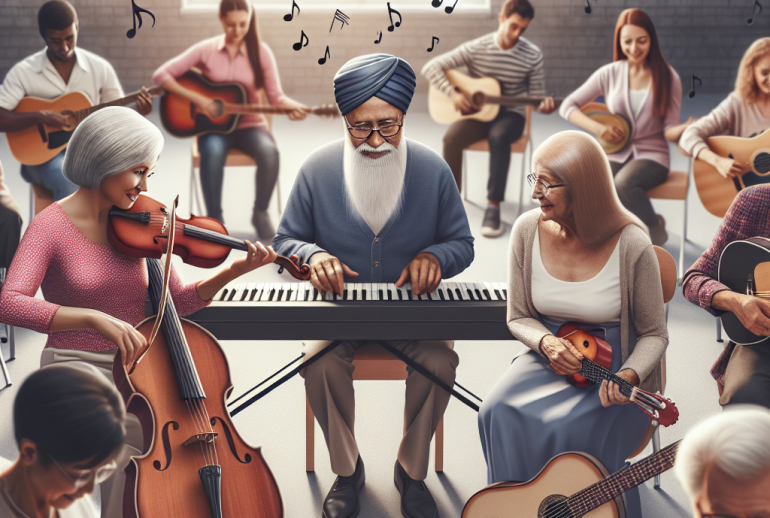Best Musical Instruments for Seniors to Learn
Aging doesn’t mean you have to slow down your passions or pursuits. In fact, numerous studies show that maintaining an active and engaged mind as we age can lead to improved cognitive function, better emotional health, and an overall more fulfilling life. One empowering and exciting way to stay engaged is by learning to play a musical instrument. Not only does this activity offer a rich tapestry of mental, emotional, and physical benefits, but it also provides a magnificent outlet for creativity and self-expression. So, which instruments are best suited for seniors looking to embark on or continue their musical journey? Here are some excellent choices.
1. Piano
The piano is often considered one of the best instruments for beginners, and this extends to seniors as well. One of the major advantages of learning the piano is the straightforward layout of its keys, making it relatively easy to understand basic concepts of music theory, such as scales and chords. Additionally, piano playing engages both the left and right hands, thereby aiding in improving coordination and mental agility.
From a practical perspective, electric keyboards are an excellent alternative for those concerned about space or cost. Modern keyboards come with weighted keys that mimic the feel of an acoustic piano, as well as headphone jacks for silent practice sessions. Moreover, a variety of educational software programs and online tutorials are available, providing convenient avenues for learning at your own pace.
2. Ukulele
The ukulele is a fantastic choice for seniors due to its simplicity and size. With only four strings, the learning curve for the ukulele is much gentler compared to its bigger siblings, the guitar or the bass. Its small size also makes it lightweight and easy to handle, which is particularly helpful for anyone who may have arthritis or similar conditions affecting the hands and fingers.
Despite its simplicity, the ukulele is a versatile instrument capable of producing a wide range of musical styles, from classical to modern pop to traditional Hawaiian music. It’s also relatively inexpensive, and many communities offer group classes specifically aimed at seniors, providing an excellent social outlet along with the educational experience.
3. Harmonica
Another excellent option for seniors is the harmonica. This compact, portable instrument is particularly known for its capability to produce evocative and soulful music across various genres, such as blues, folk, and jazz. One of the great things about the harmonica is that it doesn’t require extensive finger dexterity or wide hand movements, making it accessible for people with limited mobility.
Learning to play the harmonica can also have some unexpected health benefits. The deep, controlled breathing required to play helps to strengthen the diaphragm and improve lung capacity. This can be particularly beneficial for seniors, aiding in respiratory health as well as providing meditative and stress-relieving effects.
4. Dulcimer
The Appalachian dulcimer or mountain dulcimer is another instrument that is relatively easy to learn and is suitable for seniors. This stringed instrument is typically played while seated, and its straightforward design makes it easy to produce beautiful music right from the start. The dulcimer has a diatonic scale, which means that you can play a wide range of folk and traditional tunes with limited risk of hitting a wrong note.
Moreover, the dulcimer’s design often allows for simple strumming or plucking techniques that don’t require high levels of finger strength or dexterity. This can make it an exceptionally good choice for individuals who may find other stringed instruments challenging to play.
5. Drums and Percussion Instruments
Drumming is not only fun, but it is also incredibly therapeutic, promoting both cognitive and physical health. Hand drums like the djembe or bongos are excellent for seniors as they require minimal setup and can be played seated. Drumming enhances hand-eye coordination, rhythmic skills, and even cardiovascular health, thanks to its physically engaging nature.
Beyond the physical benefits, drumming can also be a fantastic social activity. Community drum circles and group classes provide opportunities to connect with others, making it a wonderful way to enhance social interaction while learning a new skill. Additionally, the instant gratification of producing a beat can be incredibly satisfying and motivating.
6. Violin
Though it may be perceived as challenging, learning the violin offers a rich and rewarding experience for seniors. Violins are lightweight and portable, making them easy to handle and transport. Starting with simple tunes, learners can gradually build up their skills, finding immense joy in the wide range of music the violin can produce, from classical pieces to folk melodies.
Playing the violin has the added benefit of enhancing fine motor skills and hand-eye coordination, important for maintaining cognitive and physical health in older adults. Moreover, the posture required to play can also help improve overall physical alignment and reduce back pain, provided proper techniques are followed.
7. Flute
The flute is another excellent instrument for seniors to learn. Known for its captivating, ethereal sound, the flute is relatively lightweight and easy to carry. Playing the flute involves controlled breathing, which offers benefits akin to the harmonica, including improved lung function and respiratory health. Additionally, flute playing can enhance manual dexterity and arm coordination.
Many communities offer beginner flute classes, and a plethora of online resources make it easier than ever to get started on your own. With its vast repertoire, spanning classical, jazz, and modern music, the flute offers plentiful opportunities for musical exploration and enjoyment.
Conclusion
Learning a musical instrument can be a deeply enriching experience at any age, and seniors in particular can find great joy, fulfillment, and health benefits through music. Whether you’re drawn to the structured beauty of the piano, the simple pleasure of the ukulele, or the rhythmic allure of percussion, there’s an instrument out there that’s perfect for you. The keys to success are patience, practice, and a willingness to embrace the new and the challenging. Happy playing!

